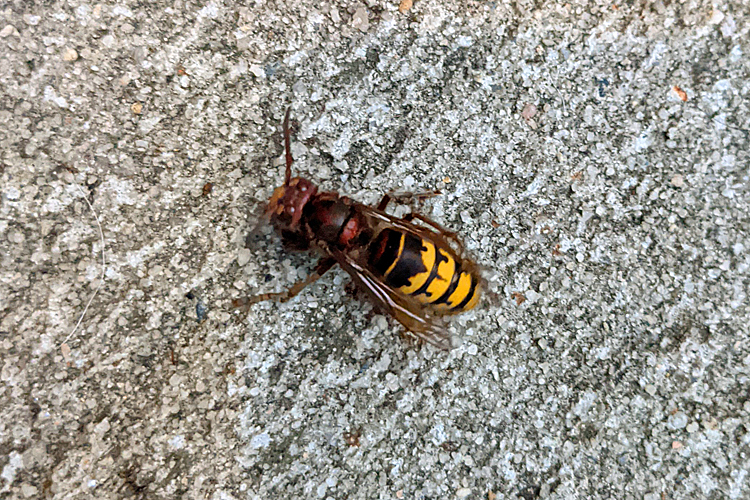In 2020, we heard a lot about Asian giant hornets. Fortunately, Worcester residents did not acquire these hornets.
However, according to Mass Audubon, we have quite a few hornet, bee, and wasp species in Worcester. One type of hornet is quite large. The European hornet (Vespa crabro) is alarming. They can grow to 1.5″ in size. European hornets are loud, obnoxious fliers, and are often confused for murder hornets. Their stings pack a punch too! You might have noticed these hornets flying around your outdoor lights at night or early in the morning. Why do they swarm your porch lights? These hornets eat insects that are attracted to light. They also chew insects to feed to their young.

Do hornets eat mosquitoes?
Do European hornets eat mosquitoes?
These hornets have a scavenger’s appetite for insects and their larvae, some of which could be mosquitoes. They are more commonly known to feed on garden pests. They also prey on yellow jackets and honeybees, but the amount of honeybees they kill is said to be negligible – not a threat to the honeybee population. The same could be said about their effect on the mosquito population. European hornets do not prey on insects alone. They are known to eat nectar and tree sap. And though they do help control garden pets, which could overrun your backyard garden, they can be detrimental to your garden in other ways. This is because they girdle trees in order to obtain sap. They also remove tree bark, which they use to make their paper-like nests.
Where do these hornets live?
Perhaps you have seen European hornets around your home, but haven’t quite pin-pointed where they are coming from. Due to their night feeding, you won’t see many out during the day until autumn, when they change up their eating patterns. You might see them swarming garbage cans or have your picnic invaded by these hornets in the fall. Even then, it can be hard to tell where they come from. European hornets live in hidden places, like tree hollows, behind siding on homes, or even in attics. What’s more, they live in colonies of 200-400. That is a lot of hornets. Compare that to mosquitoes, who can lay the same amount of eggs every few days!
Hornets are not effective Worcester mosquito control.
There are many natural mosquito predators, including bats, dragonflies, and turtles. Sometimes, maybe even hornets. However, when it comes to effective Worcester mosquito control, there is no natural predator that can outperform professional barrier mosquito treatment. When it comes to preventing mosquito bites and the potential for danger mosquito-borne illnesses, it’s better to enlist the help of a professional mosquito control company from spring all the way through autumn. Traditional mosquito barrier protection and all-natural mosquito control sprays are available, and can eliminate up to 90% of the mosquitoes around your home for two to three weeks at a time.
